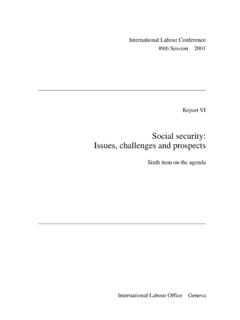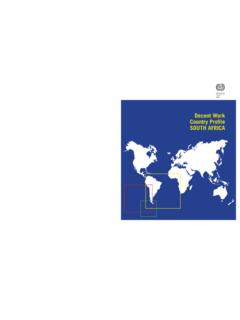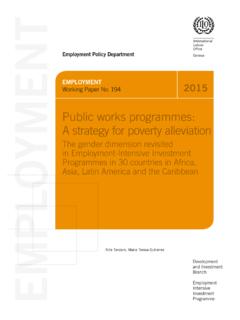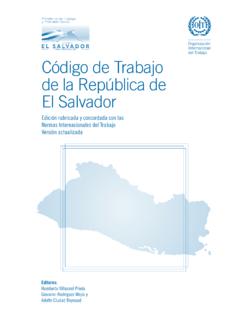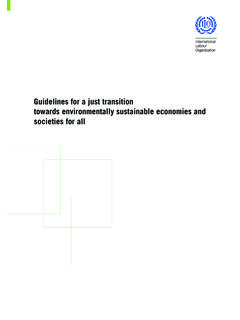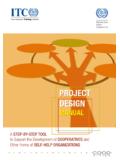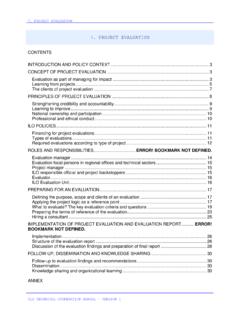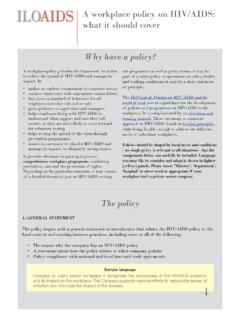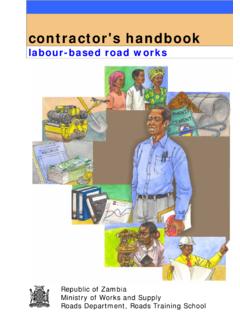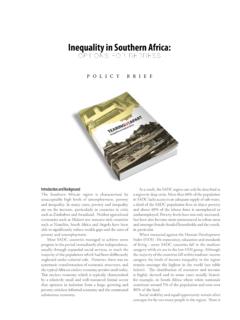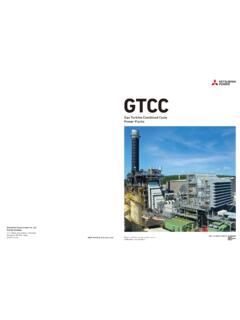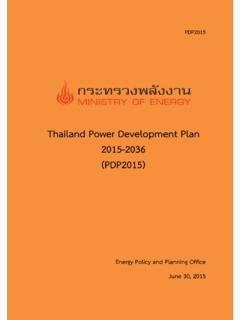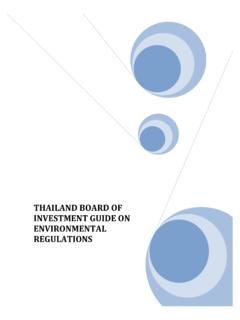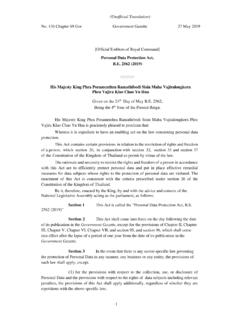Transcription of II. GLOBALIZATION AND ITS IMPACT
1 A fair GLOBALIZATION : Creating opportunities for all II. GLOBALIZATION AND ITSIMPACT Views and perceptions Common groundAfricaArab worldAsiaLatin America and the CaribbeanTransition countries of Europe and Central AsiaWestern Europe and North AmericaBusiness, labour and civil society GLOBALIZATION : Its nature and IMPACT IntroductionKey characteristics of globalizationThe institutional contextThe IMPACT of GLOBALIZATION Part II Page 11 Friday, January 23, 2004 12:53 PM 12 A fair GLOBALIZATION : Creating opportunities for all Views and perceptions Common groundAfricaArab worldAsiaLatin America and the CaribbeanTransition countries of Europe and Central AsiaWestern Europe and North AmericaBusiness, labour and civil society Globalizationfrom a wide rangeof perspectives 62. A key priority for the Commission was to see GLOBALIZATION from a wide rangeof perspectives, in regions throughout the world: how it had affected people slives; what hopes, fears and concerns it had aroused; and what action peoplebelieve should be taken to expand its opportunities and reduce its To achieve this, we launched a wide-ranging programme of dialogues and con-sultations at national, regional and global levels.
2 Participants included over 2000decision-makers and social actors involved in GLOBALIZATION issues, among themgovernment ministers and administrators, local politicians and parliamentarians,national leaders of workers and employers associations, representatives of civilsociety and religious leaders, organizations of women and indigenous peoples,academics and journalists. 2 The dialogues were designed to be interactive andparticipants exchanged ideas both among themselves and with Commissioners. Views and perceptions 64. Although the participants were not intended to be representative of publicopinion as a whole, these dialogues have helped us to see GLOBALIZATION through theeyes of people. 3 There was broad recognition of the benefits of GLOBALIZATION , buta clearly critical strand of opinion ran through the dialogues.
3 We present this briefsummary, not because we agree with everything that was said indeed there weredivergent or contradictory views among different participants but because theyhelp us understand the questions that are being posed, the concerns that are beingexpressed, the interests at stake, and the values and goals to which people sub- 2 Altogether some 26 national and regional dialogues were held. In addition to regional consultationsfor Africa, the Arab States, Asia, Europe, Latin America and the Caribbean, national dialogues and con-sultations were held in the following countries: Argentina, Brazil, Chile, China, Costa Rica, Egypt, Fin-land, Germany, India, Mexico, Philippines, Poland, Russia, Senegal, South Africa, Tanzania, Thailand,Uganda, the United States, and Uruguay. Nine special consultations were organized to hear the viewsof international business, labour, and civil society groups.
4 More details are given in an annex to theReport. To supplement this information, we have also considered the results of some opinion pollscarried out by other organizations. 3 Full reports of the dialogues are available at: Part II Page 12 Friday, January 23, 2004 12:53 PM Views and perceptions 13 scribe. Above all they have underlined the importance of a better process ofdialogue among different social actors if a fairer GLOBALIZATION is to be constructed. Common ground Kaleidoscope of opinions but much common ground 65. The views and perceptions of people depend on who they are, where they liveand what they possess. But in the kaleidoscope of opinions that emerged from thedialogues there was also much common From almost everywhere came a sense of the power of GLOBALIZATION , whetherdriven by technology, economics or politics.
5 We were sleeping on the shorewhen a big wave came , said a participant in the dialogue in Egypt. Globalizationcould be frightening, stimulating, overwhelming, destructive or creative, depend-ing on one s point of There was a widespread sense of instability and insecurity. In the Costa Ricadialogue a participant said, There is a growing feeling that we live in a worldhighly vulnerable to changes we cannot control; a growing sense of fragilityamong ordinary people, countries and entire regions . Unstable global financialsystems had devastating effects. In all parts of the world there were voices callingfor stronger systems of social protection and income security. IMPACT of globalizationon cultureand identity 68. Another common concern was the IMPACT of GLOBALIZATION on culture andidentity.
6 Some saw it as threatening traditional institutions such as the familyand the school , or threatening the way of life of whole communities. Others sawbenefits in overturning traditional ways and developing modern attitudes. Therewas frequent reference to the implications for gender equality, both positive andnegative. Employment and livelihoods 69. The one issue which came to the fore time and time again was employmentand livelihoods. While people largely favour more openness and interconnectionbetween societies, they are much less positive when asked about the IMPACT ontheir jobs and incomes. 4 A participant in the Philippines dialogue said, There isno point to a GLOBALIZATION that reduces the price of a child s shoes, but costs thefather his job . There was frequent reference to the difficulties faced by smallenterprises in taking advantage of GLOBALIZATION and yet that is where mostemployment is created.
7 The rural and informal economies remain on the margins,and the result is persistent poverty. Others were concerned with the loss of jobsas a result of industrial restructuring in the face of competitive global markets, andthe downward pressures on conditions of work and workers rights in Europeand North America as well as in middle-income and transition countries. Markets and global rules 70. Since GLOBALIZATION is only one of many factors affecting people s lives, the dia-logues sparked broader debate on the role of the market in society and how theneeds and aspirations of people can be expressed and met in their own com-munities. It was widely argued that progress was impeded by the unfair rules of the 4 Multi-country opinion polls reach similar conclusions. For example, an average 48% of peoplepolled by Environics International in seven countries thought that GLOBALIZATION was good for qualityof life and economic development, but only 38% thought the same about jobs and workers rights(full survey report in Global Issues Monitor 2002 , Toronto, Environics International, May 2002).
8 Another multi-country survey found that people generally view the growth in foreign trade, globalcommunication and international popular culture as good for them and their families while at thesame time finding that many aspects of their lives including some affected by GLOBALIZATION aregetting worse , including the availability of good-paying jobs . (See Views of a changing world ,Washington DC, the Pew Research Center for the People and the Press, June 2003, ) Part II Page 13 Friday, January 23, 2004 12:53 PM 14 A fair GLOBALIZATION : Creating opportunities for all global economy. These were biased in favour of the rich and powerful andneglected the social IMPACT of economic policies. The adverse effects were some-times strikingly similar in different parts of the world.
9 For instance, the damagedone by agricultural subsidies was illustrated by identical complaints in the Braziland Tanzania dialogues: that the import of European powdered milk was crowdingout demand for their domestic milk, while at the same time introducing an However, fair rules do not automatically lead to a fair result. Efforts wereneeded to help those in a weaker position to jump on the bandwagon of devel-opment . The current agenda was considered to be too focused on trade andinvestment, and not enough on human rights and the environment, partly due toa democratic deficit at the international There was widespread agreement on the need for a renewed role for the State,built on the rule of law and democratic institutions, and working in partnershipwith other social actors.
10 While the concept of an all-embracing State has been dis-credited, GLOBALIZATION had weakened the State too much. In order to respondeffectively to GLOBALIZATION the State needed to be able to develop nationalcapacities, regulate economic activity, promote equity and fairness, provide essen-tial public services and participate effectively in international negotiations. Need forinvestment ineducation andskills 73. A recurring theme was that to take advantage of the opportunities of global-ization, people and countries had to invest in education, skills and technologicalcapabilities across the board. Education systems needed reform and illiteracy hadto be tackled. Migration andregionalintegration 74. Migration was another widespread concern, for countries of in-migration andout-migration alike.
